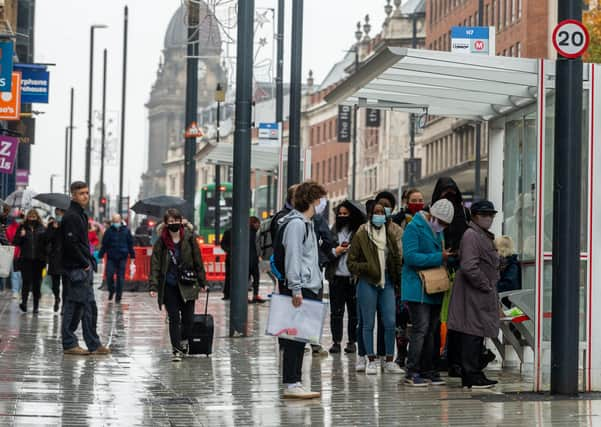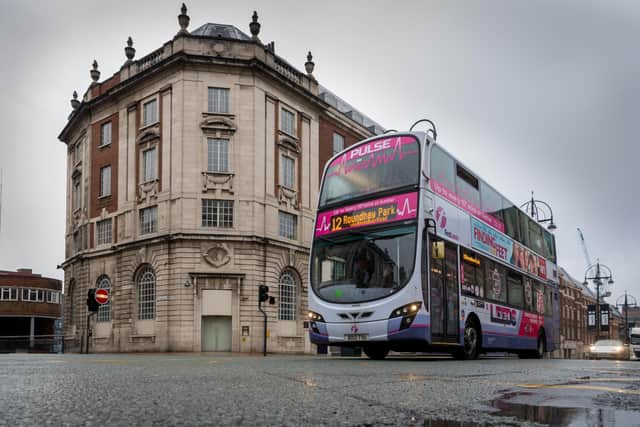Better buses can transform ‘left behind’ areas – Judith Cummins


That is why I have campaigned for better transport links across the North including a new Northern Powerhouse Rail line with a flagship station in Bradford city centre. There is no doubt this would boost economies of the North and it is estimated it would create 27,000 extra jobs in Bradford.
In transport terms, spending in London is seven times more per capita (£3,636) than in Yorkshire (£511). I’m worried the persistent lack of investment in Bradford, and the North, will continue, because the Government will not seriously address the unsatisfactory value for money assessment that favours areas which have historically high levels of spending, such as London and the South East.
Advertisement
Hide AdAdvertisement
Hide AdJust as the lack of good rail links limits people from accessing opportunities beyond our city, a decline in public bus provision limits many people from accessing opportunities beyond their own neighbourhood.


Improving local transport connectivity can help people in these ‘left behind neighbourhoods’ to find a job, get to a hospital for treatment, or just visit family and friends.
A new report titled Connecting communities: improving transport to get ‘left behind’ neighbourhoods back on track, and produced for the All-Party Parliamentary Group for ‘left behind’ neighbourhoods, shows that 84 per cent of ‘left behind’ neighbourhoods have worse connectivity than the average across England. Yet many are more reliant on public transport as 40 per cent of households have no car, compared to the England average of 26 per cent.
The report’s release follows the Government’s Bus Back Better strategy which seeks to improve bus services outside of London. It encourages local authorities to build strong relationships with providers and commits money to help with this.
Advertisement
Hide AdAdvertisement
Hide AdA key recommendation of the APPG’s report also looks to boost local authority capacity to help improve transport in ‘left behind’ neighbourhoods.


However, where the Government’s strategy falls short is the lack of recognition around the importance of building community capacity, so local people can advocate for their own needs and the transport that will best serve them. Another case of decisions being taken for them rather than by them.
The 225 ‘left behind’ neighbourhoods in England that our group speak up for in Parliament not only rank within the top 10 per cent of places on the Index of Multiple Deprivation, but also within the same percentile of the Community Needs Index (CNI).
The CNI considers the provision of places to meet, the presence of an active and engaged community and how connected a place is, both in terms of digital connectivity and transport provision. The combination of these factors leaves ‘left behind’ neighbourhoods with little opportunity or resource to improve their own outcomes.
Advertisement
Hide AdAdvertisement
Hide AdMore than 10 per cent of these areas sit within this region and one is in my own constituency. I am determined these communities gain the skills, to prevent themselves being consistently left behind because they miss out on opportunities and access to funding.
If these communities receive targeted, hyper-local funding, then many opportunities could be opened up. Local people can utilise modest levels of funding to make a huge difference to their local area, because they know their neighbourhood best.
Hyper-local funding won’t provide the resources for the massive investment for the infrastructure that Bradford and the North needs, but it will help to build networks of people within a community who can take decisions for themselves. It is this investment in both people and places that will deliver the best long-term outcomes for ‘left behind’ neighbourhoods.
We must ensure these places don’t continue to fall further behind. We must build their capacity and confidence at the same time as providing them with better transport connectivity.
Advertisement
Hide AdAdvertisement
Hide AdI will continue to campaign for a Northern Powerhouse Rail stop in Bradford so my constituents can access more employment and education opportunities across the North. But I will also continue to highlight the importance of good local bus links so our local economies and communities can thrive and no neighbourhood is left behind.
Judith Cummins is Labour MP for Bradford South and Vice Chair for the All Party Parliamentary Group for ‘left-behind’ neighbourhoods.
Support The Yorkshire Post and become a subscriber today. Your subscription will help us to continue to bring quality news to the people of Yorkshire. In return, you’ll see fewer ads on site, get free access to our app and receive exclusive members-only offers. Click here to subscribe.
Comment Guidelines
National World encourages reader discussion on our stories. User feedback, insights and back-and-forth exchanges add a rich layer of context to reporting. Please review our Community Guidelines before commenting.